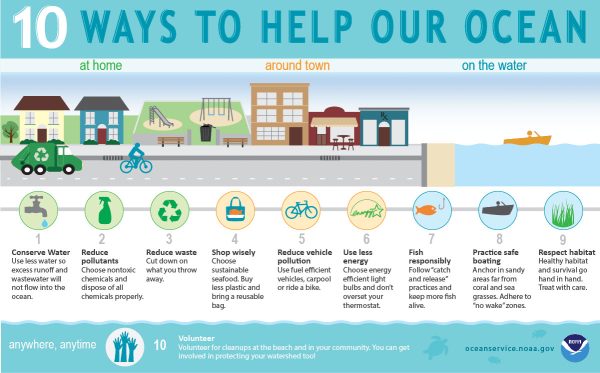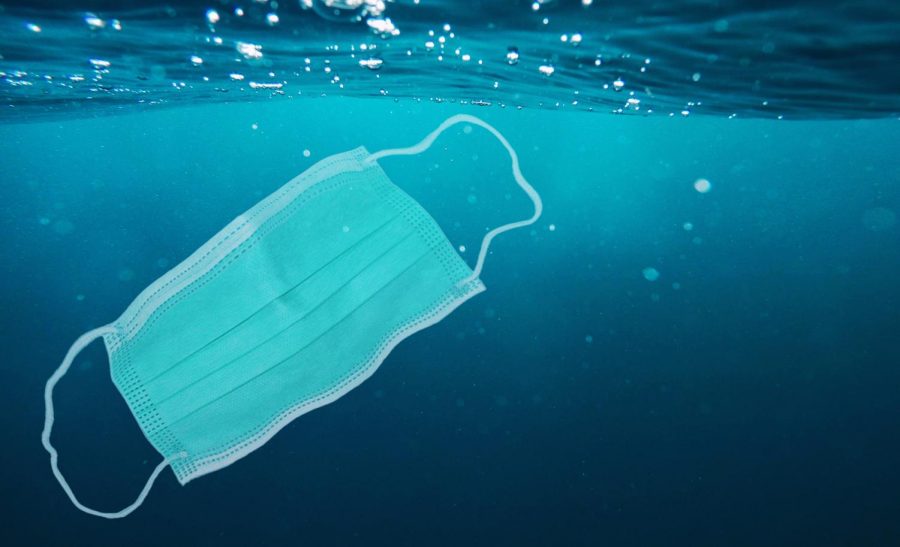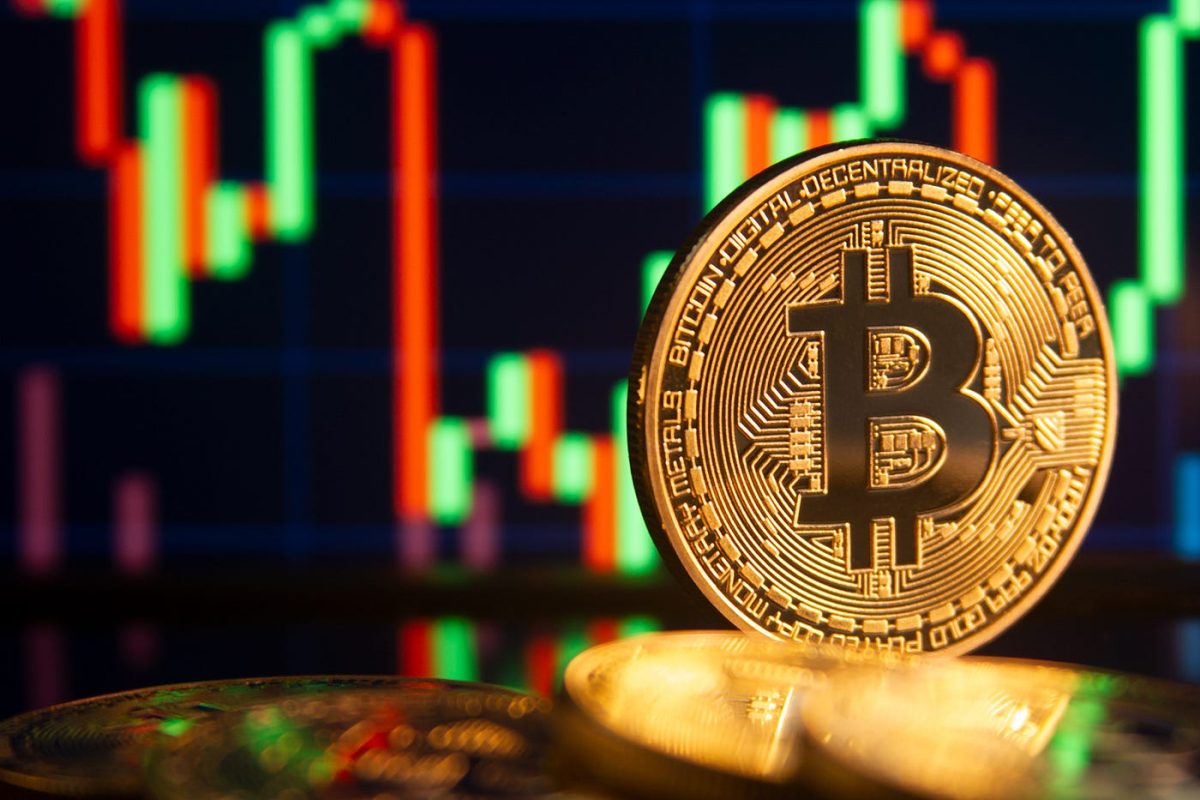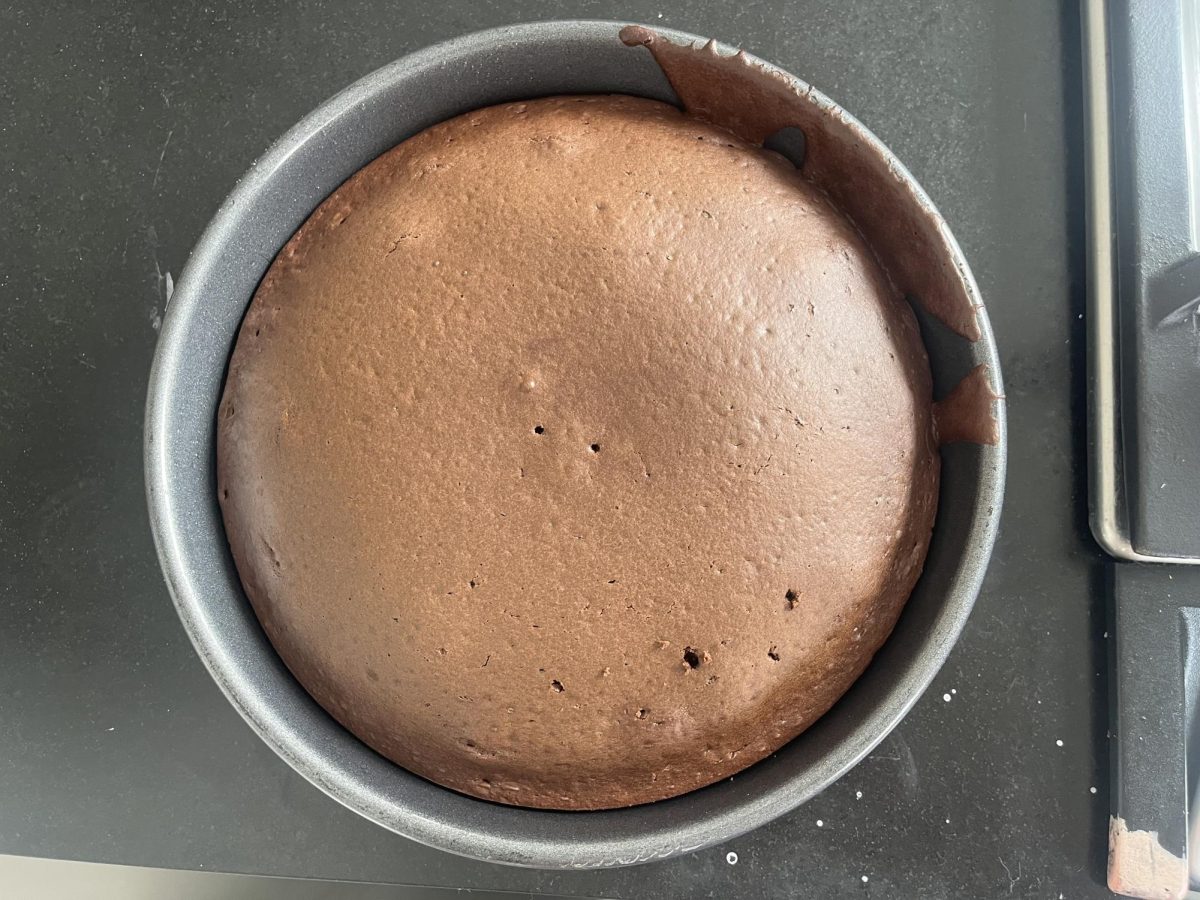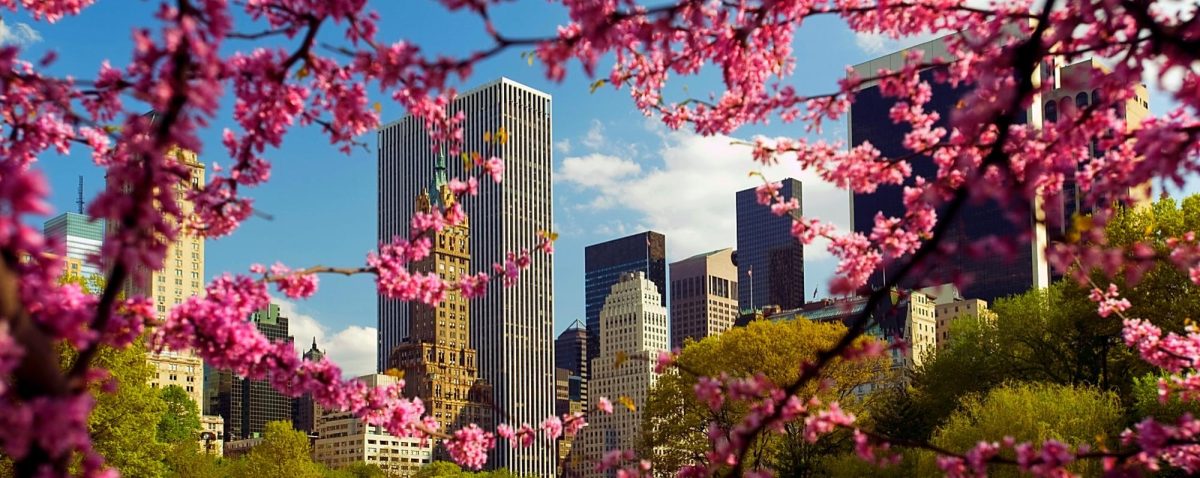Imagine yourself as a fish. You are swimming in an ocean with 350 million metric tons of plastic floating around. You are hungry and can’t tell the difference between your next meal and a floating straw. You end up slowly dying from the straw clogging your digestive system.
This is what happens to millions of animals in the ocean, and we are losing our sea animals because of it. Since 1960, plastic pollution has been a problem, and we’ve done little to stop it. Plastic is all around the 7 great oceans, but it has affected the North Pacific Ocean and its animals the most with 2 trillion pieces of plastic floating around as shown in the picture below.
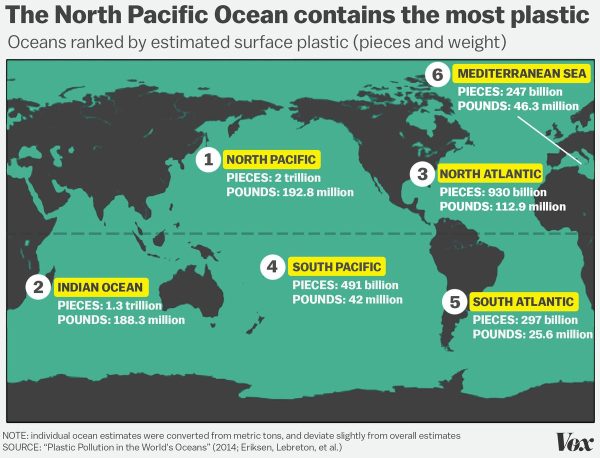
Such acts can lead to so many bad outcomes. It can cause the deaths of sea animals, contaminate our water/food, and cause human health issues. More than 3 billion people have been affected by ocean pollution. Coastal pollution spreads life-threatening infections, such infections as Vulnificus and Leptospira.
What is ocean pollution and what does it do to sea animals and their environments?
What is ocean pollution? Ocean Pollution is trash and garbage floating in the ocean. The trash impacts the sea animals and humans negatively. For example, fish can mistake plastic for food. Sea animals can eat plastics and that can clog their digestive system. There are billions of trash in the oceans and millions of pounds of trash.
There are multiple outcomes to polluting the ocean. For example, coral reefs have a high chance of getting diseases and giving diseases to the sea animals around the ecosystem. According to Earthday.org, “The chances of disease on a coral reef are enhanced 22-fold by plastics. In 2018, a huge survey of the 159 coral reefs across the Asia-Pacific region showed that over 11.1 billion plastic particles are entangling the corals, and this number is estimated to increase dramatically by 40% by 2025. Plastic debris may also cause physical damage to the corals by exhausting the resources for the wound-healing process. Importantly, more than 7000 species of fishes, invertebrates, plants, sea turtles, birds, and marine mammals can be found in the coral reef ecosystem.”
This shows what plastic pollution can do to the ocean’s environment. A lot of species of fish, plants, sea turtles, and more can be found in the coral reef ecosystem, and they will be in danger because of the infected diseases coral reefs can give.
Additionally, ocean pollution is an act of harm and destruction because it harms biodiversity, populations, and the environment. The way ocean pollution harms biodiversity is it releases chemicals that harm the environment. For example, trash, gasses, chemicals, sediments, and more. Researchers from Conserve Energy Future state that, “Biodiversity is important because it can provide for basic human needs like fuel, shelter, food, and medicine.
Now, water pollution releases harmful substances into water bodies like rivers, lakes, and oceans. Anything that affects the typical functioning of the ecosystem is a pollutant.”
Chemicals, trash, gasses, microorganisms, sediments, petroleum, fertilizers, and even radioactive energy are some of the most common materials that pollute our water bodies.
Out-of-place pollutants alter aquatic environments, harming living creatures and biodiversity. The impact varies with the concentration and toxicity of the substances.
And although water pollution happens in our water bodies, the toxic substances will spread to other domestic and commercial areas, such as crops, animals, and even our drinking water.”
This elaborates on how ocean pollution can harm the ocean and biodiversity. Biodiversity can be harmed in multiple different ways as stated above. Some may not know how biodiversity helps us humans. Without biodiversity, we wouldn’t have some things in our daily life.
How Does Plastic in the Ocean Affect Us?
Plastic in the ocean isn’t only affecting the sea animals, it’s also affecting us humans. Youtube channel Kurzgesagt – in a nutshell reveals that tiny plastic bits called microplastics are released from floating plastics being exposed to UV rays that crumble into smaller microplastic pieces.
Kurzgesagt states that there are 51 trillion microplastic pieces floating in the ocean for tiny fishes and crabs to eat. Bigger animals will eat these plastic-exposed animals and hence have plastic in them. This process will continue to go up the food chain until most animals are infected with microplastic, including the ones that end up on our plates. The fish we catch to eat are infected with plastic and so will we.
We are poisoning ourselves and our marine animals for the cost of cheaply made accessibilities.
Many people believe that the solution to solving plastic is simply to burn it.
However, the issue with this solution is that the burning plastics will emit toxins that can pollute the environment and air. Liam O’Fallon, health specialist in the Population Health Branch, states that “Household air pollution from solid fuel combustion is a major contributor to air pollution and poor health.” Burning plastic can not only affect the environment, but it also cause lung cancer. O’Fallon also remarks that plastic doesn’t go away if you burn it, it’s always there.
From a different perspective, not only is plastic physically affecting humans, but in some cases, it’s mentally affecting us.
iSchooler Jing Weng states that he feels bad for the fish and that he wishes to do something about plastic in the ocean because he doesn’t want the sea animals to suffer.
“Uh, I feel bad about the animals, and it has impacted me negatively because, I mean, I love animals”
When we asked Jing what he could do to in order to help stop ocean pollution, he stated; “I would maybe start like a beach clean up club so we can clean up a lot of trash on the beaches”
Additionally, a study led by Philip Landrigan revealed that plastic isn’t the only bad thing in the ocean.
Philips found out that there are other substances in the ocean that can be deadly such as “mercury, pesticides, industrial chemicals, petroleum wastes, agricultural runoff, and manufactured chemicals embedded in plastic.” These substances can and will poison you if they get into your body and it will if you swim in infected water or eat poisoned fish.
14-year-old Lincoln Niccolof also explains just what plastic can do to you when it gets into your body: “Once the microplastics enter your body and get into your lungs, your body will try to fight it. However, the microplastics will reduce lung capacity and damage your lungs which can cause lung cancer.”
How does garbage end up in the oceans?
Garbage is all over the oceans. Millions of pounds of garbage are in the ocean. But, how does it end up in the ocean? Garbage ends up in the ocean because of people littering, storms, and poor waste management practices.
All of these acts put garbage into the oceans. Rain storms, hurricanes, tsunamis, and such extreme natural events.
People go to the beach and litter. They will throw food and plastics into the ocean without caring or knowing what they have done.
Researchers from NOAA state “All marine debris comes from people with a majority of it originating on land and entering the ocean and Great Lakes through littering, poor waste management practices, stormwater discharge, and extreme natural events such as tsunamis and hurricanes.”
This illustrates how garbage ends up in the ocean. The more events that happen, the more pollution will be in the ocean. If a party happens at the beach, most people just leave their trash on the floor. The waves will pick up the trash and pollute the ocean.
Olivia Farfan, iSchool student, said, “ Well, no and yes, because like there are times when I get too lazy to throw all my plastics and I just like, or I accidentally put the plastic in the garage and like that, like, you know, so like, yeah, sometimes I do.”
This shows the way that we humans affect and harm the oceans and how garbage ends up in there. Everyone has an impact on the ocean. More than 30,000,000 pounds of garbage is in the ocean. We have produced 8.3 billion metric tons. This is very bad for the environment and oceans. This hurts everything in the ocean. Ecosystems, sea animals, populations, and so much more. This could decrease populations and cause extinction.
What Can iSchool As A Community Do To Help Stop Ocean Pollution?
iSchool as a community can take small steps to help stop ocean pollution. Even if it’s not much, every step counts. So, what can iSchool do?
One way we can stop ocean pollution is If communities start cleaning up trash on the rivers it will help lower ocean pollution exponentially. Most rivers are connected with oceans so if we lower the amount of trash in the rivers, then we will keep trash from entering our oceans.
“For example, the Mekong River is one of the most polluted rivers in the world. It carries around 40,000 tonnes of plastic to the ocean every year. Therefore, community-based clean-up projects along the Mekong River can help to reduce the amount of plastic waste that enters the ocean.”
Furthermore, If communities do the basic thing of recycling then the world would be a cleaner place. Writers Dave Thomas and Dustin Lattimer, authors of the Why Don’t Most People Recycle? Article states that “94% of Americans support recycling, and 74% say it should be a top priority. But only about 35% of people actually recycle. The top reason Americans say they don’t recycle regularly is a lack of convenient access.”
The North Pacific is the most polluted ocean in the world, and that is mainly because of the United States of America. If Americans alone begin to recycle, then one of the most plastic-infected oceans could become a little “healthier”.
Writer of the What Would Happen If Everyone Recycled article Ashley May wrote, “If everyone recycled we will have moved from a linear ‘take, make, waste’ economy to one that is more circular by keeping materials in our economy and not allowing them to waste away in landfills.”
No matter what studies, activists, and scientists say, some people might not want to/ can’t clean up plastic on the beaches, and that’s totally fine. There are other ways to help stop ocean pollution than being on the “front line.”
Farfan also remarked “I feel like iSchool and the community can help adjust this issue. Is like, do like programs, or like, I feel like the community can also cite some sites. Or like, workers can actually clean up the sea and everything. If we all come together and actually brainstorm, we can make a big difference. We all go help collect trash and make signs. We inform the people how polluting the oceans can impact us. I never took ocean pollution seriously till I started to see how bad it was impacting us. When I found out ocean pollution was impacting sea animals and the sea animals I eat. I started to get concerned and worried that I might have been affected negatively. I want to help stop this problem. There are so many bad things that can happen to us if we keep on polluting. So I think we should really have a program or have the whole school come together and do something about it.”
Communities could start fundraisers to help support volunteer programs and companies to fight ocean pollution. Fundraisers help tremendously as they allow people who can’t physically be there to still be helping with their money.
iSchoolers could make baked goods and sell them at a bake sale or sell books to raise money and donate to organizations that help fight ocean pollution (some organizations that you can donate to are, Surfrider Foundation, Ocean Conservancy, 5 Gyres Institute, and Oceana).
Ocean pollution is a big problem in this world today. People are getting sick because of ocean pollution. Sea animals are dying and ecosystems are breaking. All of this is happening because of us. We are harming the world and sea animals. We have to make a change, a positive change that can help. Therefore, ocean pollution isn’t just a problem, it’s an important problem.
